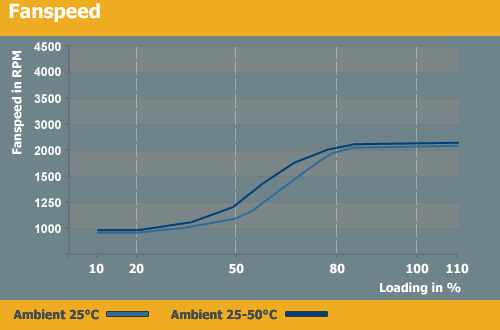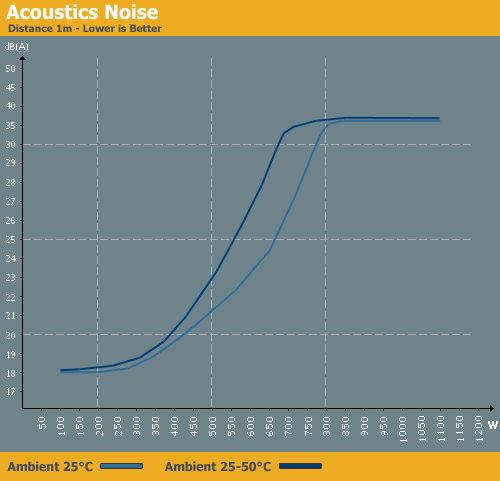Fan Speed and Acoustic Noise


Looking at our figure and comparing it to Corsair's graphs on their website tells us something is up. Yate Loon states a maximum acoustic noise of 48.5dB(A) with 2800RPM spindle speed. Since this unit never reaches 2800RPM - we measured a maximum of up to 2070RPM at any temperature - the acoustic noise doesn't get as loud as stated. Corsair shows 44dB(A) on their website, which we could never reach under any scenario during our testing.
We appreciate the open and frank figure from Corsair, since other manufacturers would have probably shown much lower results. The fact that we have better results than the manufacturer states is a good thing and we are glad we didn't reach 44dB(A). Normally we see lower noise levels up to around 50% load (500W on this unit), but the fan already starts to turn faster at 250W, which is unnecessary. The unit does not really need any more cooling at such a low load, but Corsair wanted to have superb cooling in all situations so the temperature controlled fan starts spinning faster at a lower RPM. Maximum fan speed is unfortunately reached at 80% of load, bringing with it a noisy working environment, but if you imagine three high-end graphics cards connected to this power supply the additional 35dB(A) will not make any real difference to the overall sound levels.










17 Comments
View All Comments
Powervano - Wednesday, April 30, 2008 - link
Oh, my bad :-D Sorry Cristoph. But your new reviews are way better and I even think best of all :)Powervano - Tuesday, April 29, 2008 - link
Thank you! :)piroroadkill - Tuesday, April 29, 2008 - link
Sweet jesus, I did certainly not expect those graphs for the 3.3 and 5v lines, with even slight increases, and as for the 12v, well, it stays bang on target.Corsair, even though they've entered the market late, have seen issues with other PSUs and created the best PSUs in every segment - it seems they can do no wrong.
Corsair, I salute you.
ineedaname - Wednesday, April 30, 2008 - link
Don't forget that corsair PSU's are actually rebranded Seasonic PSU'sDrMrLordX - Thursday, May 1, 2008 - link
Isn't the HX1000 a CWT unit?Christoph Katzer - Thursday, May 1, 2008 - link
Yes it is. Corsair buys from several companies...Calin - Tuesday, April 29, 2008 - link
Assuming a 500W draw on the wall socket, a change from 85% to 86% efficiency, the power lost inside the power supply unit (as heat) changes from 75W to 70W. While this isn't an important figure by itself, this can make is run cooler or be a bit less noisy.If you take into account the power delivered to the internal components (not the one drawn from the wall socket), this improvement in efficiency is (a little bit) better than that: for a 500W internal load, you would use 588.2W from the wall with the 85% power source, and 581.4W for the 86% unit. While the total difference is small (7W or so), it is still there.